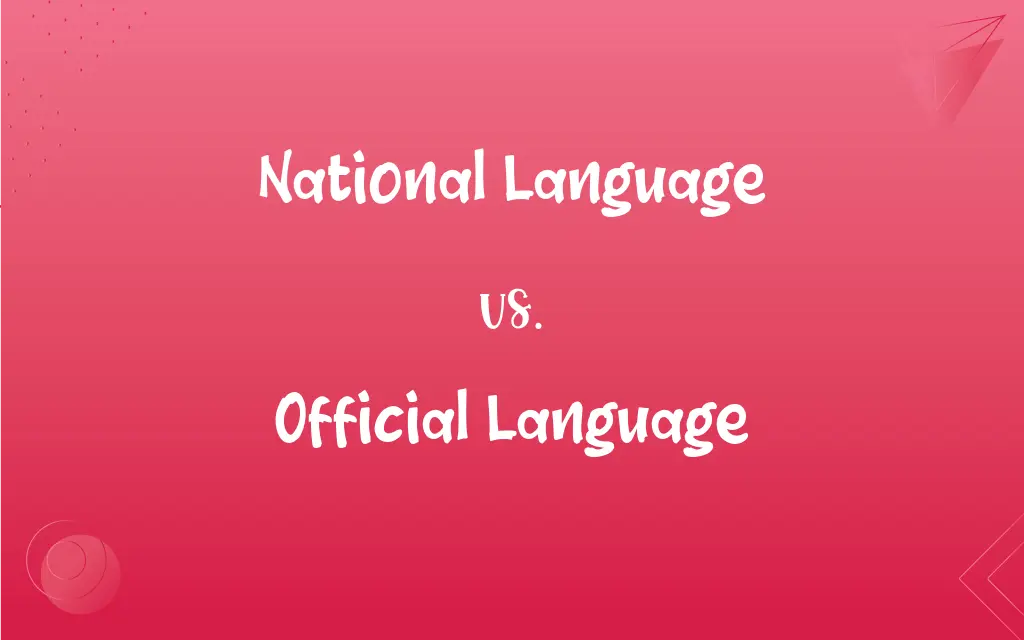National Language vs. Official Language: What's the Difference?
Edited by Aimie Carlson || By Harlon Moss || Published on November 2, 2024
National language symbolizes a nation's identity, while an official language is legally established for government use and official purposes.

Key Differences
A national language holds cultural and historical significance, representing the nation's identity. An official language has a designated legal status, used in government, law, and official documents.
The national language often embodies national heritage and identity. The official language serves practical functions in governmental operations, legislation, and administration.
National languages are tied to national identity and cultural pride. Official languages are chosen for pragmatic reasons, like administrative convenience and governance.
A country can have several national languages representing diverse cultures. Official languages are fewer, chosen for efficient communication in official matters.
National languages evolve with cultural shifts and are less subject to legal changes. Official languages can be changed or added through legal processes and government decisions.
ADVERTISEMENT
Comparison Chart
Significance
Cultural and historical identity.
Legal status for government and official use.
Purpose
Represents heritage and national pride.
Used in governance, legal systems, administration.
Selection Criteria
Cultural, historical relevance.
Practicality, administrative efficiency.
Number in a Country
Can be multiple, reflecting diversity.
Usually fewer, selected for official communication.
Change and Adaptation
Evolves culturally, less legal alteration.
Can be legally established or changed.
ADVERTISEMENT
National Language and Official Language Definitions
National Language
Can coexist with other national languages in diverse societies.
In Switzerland, multiple national languages coexist, representing its cultural diversity.
Official Language
Can be different from the most widely spoken or national language.
In Singapore, Malay is the national language, but English is an official language.
National Language
A language inherently tied to a nation's cultural identity.
Swahili, as the national language, plays a key role in Kenya's cultural heritage.
Official Language
Often used in education, judiciary, and official media.
In India, English and Hindi are used as official languages in the Supreme Court.
National Language
A symbol of national unity and identity.
Arabic, as the national language of Egypt, is a unifying cultural element.
Official Language
Selected for efficiency in governance and communication.
English, as the official language in many countries, facilitates international diplomacy.
National Language
Often used informally by the general population.
In Japan, the national language, Japanese, is spoken by the vast majority.
Official Language
Legally recognized for administrative purposes.
Spanish, as the official language in Spain, is used in all legal documents.
National Language
Reflects the historical and cultural evolution of a nation.
Hindi, as India's national language, is integral to its cultural fabric.
Official Language
A language designated for use in government and official communications.
English is the official language for governmental proceedings in Australia.
FAQs
What is a national language?
A national language is a language that has a special connection to a country's identity and culture.
Can a country have more than one national language?
Yes, countries with diverse cultures often have multiple national languages.
How does a national language influence culture?
A national language is a key element of a country's heritage and cultural expression.
Is the official language always the most spoken language in a country?
Not always; the official language is chosen for administrative efficiency, not necessarily based on the number of speakers.
What defines an official language?
An official language is legally established for use in government and official settings.
Does a national language have legal status?
A national language may not have a specific legal status like an official language does.
How is an official language used in international relations?
Official languages are used in diplomatic communication and international treaties.
Do national languages change over time?
National languages evolve with cultural and societal changes.
Are official languages used in legal proceedings?
Yes, official languages are typically used in legal proceedings and governmental documents.
Can a national language be an official language?
Yes, a national language can also be designated as an official language.
Are official language decisions influenced by history?
Yes, historical factors often influence the choice of official languages.
Do national languages impact national literature?
Yes, national languages significantly influence the development and character of a nation's literature.
How are official languages chosen?
Official languages are chosen based on legal, administrative, and practical considerations.
Are national languages taught in schools?
Often, national languages are taught in schools, reflecting the country's cultural heritage.
Does a national language unify a country?
A national language can be a unifying factor, representing shared heritage and identity.
Can a country change its official language?
Yes, a country can change its official language through legal and governmental processes.
Is English a common official language globally?
Yes, English is a common official language in many countries due to its global usage.
Can immigrants influence a country’s national language?
Immigrants can contribute to the linguistic diversity, but national languages are generally tied to long-standing cultural identity.
Do national languages play a role in tourism?
Yes, national languages can be a significant part of the cultural experience for tourists.
How are new official languages added?
New official languages are added through legislative changes or government decisions.
About Author
Written by
Harlon MossHarlon is a seasoned quality moderator and accomplished content writer for Difference Wiki. An alumnus of the prestigious University of California, he earned his degree in Computer Science. Leveraging his academic background, Harlon brings a meticulous and informed perspective to his work, ensuring content accuracy and excellence.
Edited by
Aimie CarlsonAimie Carlson, holding a master's degree in English literature, is a fervent English language enthusiast. She lends her writing talents to Difference Wiki, a prominent website that specializes in comparisons, offering readers insightful analyses that both captivate and inform.







































































